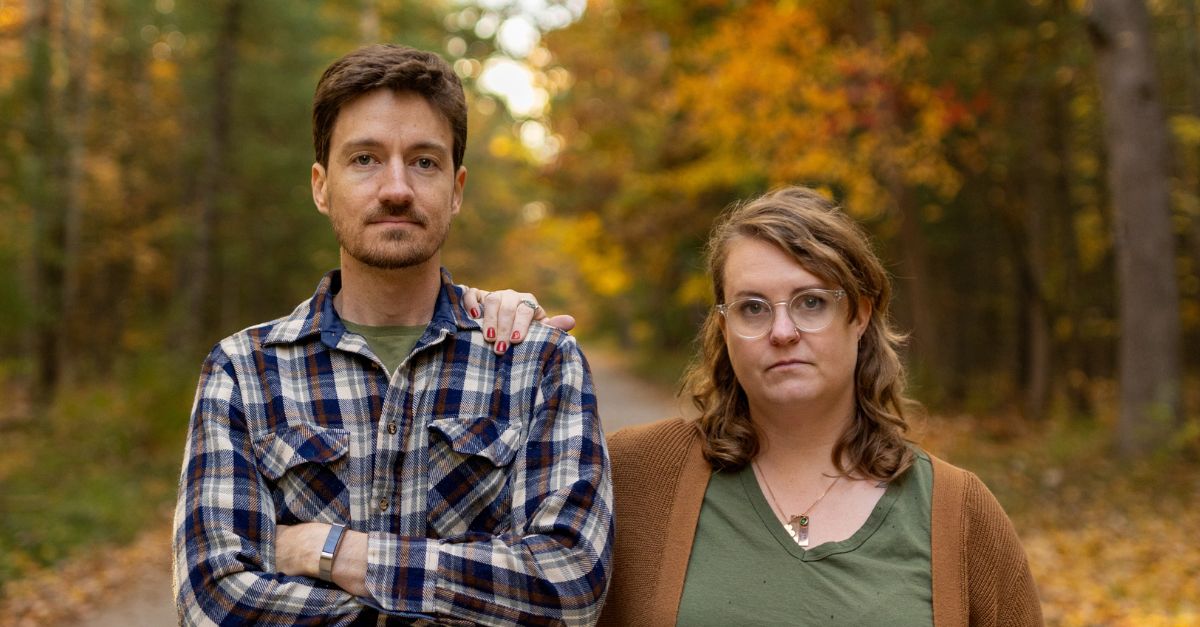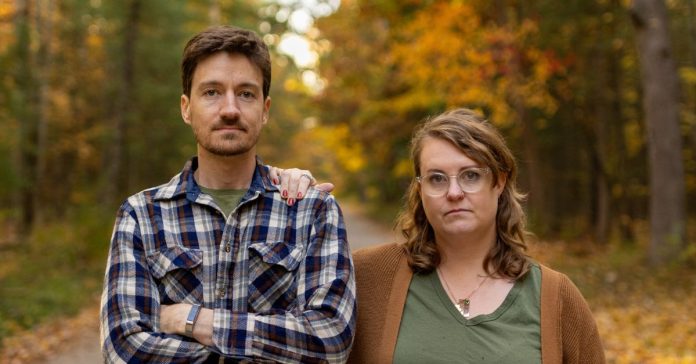
Peter and Annica Quackenbush (image via Institute for Justice).
A Michigan couple is asking a state court to strike down a local ordinance banning all cemeteries that they say was put in place just to stop them from opening the environmentally friendly burial ground they had planned for over a decade.
Grand Rapids couple Peter and Annica Quackenbush planned to start a “green cemetery” large enough to accommodate the burial of thousands of people and pets to honor “the last wishes of people who value environmental sustainability and connection with nature.” The couple planned to establish the West Michigan Burial Forest, which would follow guidelines set by the Green Burial Council, a private organization that certifies green cemeteries. They shopped for and purchased land, started the permit process, and gathered interest from local families — only to find that the township passed an ordinance that would make their business plan untenable.
The Quackenbushes are represented by the Institute for Justice, a nonprofit government watchdog group. They argue the Michigan state constitution protects their right “to use private property and to engage in any business that does not harm the public, subject only to regulations which have a reasonable relationship to public health, safety, or welfare” — and that their green cemetery fits squarely within authorized conduct.
In a 30-page complaint filed in Michigan state court, the Quackenbushes explained the process of “green burial”: bodies are buried directly in the earth with “organic materials,” such as a wooden or wicker casket, a cotton or linen shroud, or no container at all. Neither embalming chemicals, stone casket containers, nor headstones are used. Rather, trees and rocks native to the area are employed as natural markers for the place where human remains are put into the earth.
The plaintiffs pointed out that similar burial methods “were the norm in the United States until the Civil War, when embalming began to be used for the first time to enable deceased soldiers to be returned home with their remains intact.” They also said that a recent study shows that 60% of Americans would be interested in exploring similar burial options and that the technique is in line with Judaic and Islamic practices. Further, they created a website on which over 200 people showed an interest in using their planned burial ground and created a waitlist on which 245 people pledged to purchase a plot once their business opened.
The plaintiffs also pointed out in their filing that green burial cemeteries are not unusual. As of September 2023, there were approximately 420 green burial cemeteries in the U.S. and Canada, they said.
The Quackenbushes’ plan to open a green cemetery was a long-thought-out idea with special meaning for them. Annica is a birth doula who also studied to be a death doula who assists families with end-of-life care; Peter is pursuing a Ph.D. in biology, specializing in the study of tropical plants. The couple said that for over 10 years, they have been developing a plan to operate a conservation burial ground both as a means of continuing their professional work and to further their personal conservation goals. Moreover, they said they are entrepreneurs who hoped to use their business plan as the primary means of support for their family.
Effecting their plan involved the purchase of a large and affordable piece of forested property in Western Michigan that was accessible in winter conditions and suitable for use as a burial ground. The process took years. Ultimately, the couple purchased a 20-acre parcel of white-pine forest in Brooks Township for $106,500 — making the purchase less than 24 hours after the property was put up for sale. The property contained the kind of trees, vegetation, and animals native to Western Michigan before it was extensively logged in the 19th century.
The Quackenbushes planned to open the West Michigan Burial Forest as a nonsectarian green cemetery open to the general public regardless of religious affiliation. Per the complaint, they planned to keep the property “undeveloped and protected as a forest of native plants in perpetuity,” by using burial practices that preserve soil health and native plants.
The plaintiffs say their plans include burial in accordance with Michigan law, and that burials are expected to cost about $3,500 — close to what nearby cemeteries charge.
Because the Quakenbushes planned to use their land as a burial ground in perpetuity, they, together with a conservation organization, planned to obtain a conservation easement that would permanently limit the land’s use for future generations. The couple communicated with zoning officials in Brooks Township in February 2022 about their plans and were provided with instructions to qualify for the requisite permits. At the Quackenbushes’ request, the district health department took steps to approve the site.
The plan for the West Michigan Burial Forest reached its final stages in 2023, and by summer, it had secured a conservation organization partner.
In their complaint, however, the couple alleged that unbeknown to them, Brooks Township had already been at work planning to shut down their plans. They asserted that in early 2022, Brooks Township’s lawyer advised town officials not to let their cemetery operate. Following their counsel’s advice, in June 2023 the township unanimously passed the Township Cemetery Ordinance which put a blanket ban on all new cemeteries in the region.
The ordinance specified that it applied not only to “conventional” cemeteries but also to any “green cemetery, conservation cemetery, burial forest or forest cemetery.”
Shortly thereafter, the township’s lawyer sent the Quackenbushes a warning letter: proceed with their plans and the township “will take appropriate legal action.”
The plaintiffs alleged that they were specifically targeted by the ordinance in violation of their rights under the state constitution. They ask that the court declare the ordinance invalid and award only $1 in nominal damages.
“We have a dream of providing people with the option to be buried in nature, and we found an ideal place where we could do that,” said Peter Quackenbush in a statement. “We don’t see this as a public harm. In fact, we see this as a public benefit. Banning this project for no good reason is deeply disappointing and simply not right.”
“We knew starting a burial forest would involve trailblazing, and we were ready for that,” added Annica. “But the township implementing a new ordinance to block our project specifically felt like a really low blow. We have some supporters in their final stages of life, and we want to give them the kind of burial they long for.”
IJ Senior Attorney Renée Flaherty said the Michigan constitution is clear: “Peter and Annica have the right to use their property as they see fit and to pursue their chosen occupation free from arbitrary government interference.”
“This case is about making sure the law is followed fairly and equally for everyone,” IJ Attorney Katrin Marquez said. “The government can’t decide to take away your rights on a whim.”
Brooks Township has maintained that the Quackenbushes’ project would have been disallowed under its law even before the change in 2023. At a public meeting in February 2022, town officials expressed concern over the legality of a new cemetery.
Representatives for Brooks Township did not immediately respond to a request for comment.
You can read the full complaint here.
Have a tip we should know? [email protected]

